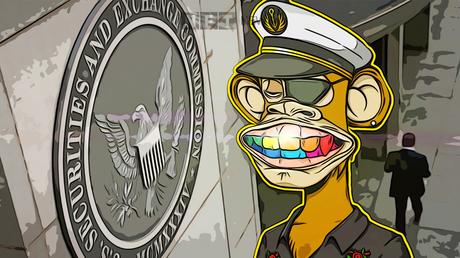
An unknown piece of news enraged the NFT community last week.
According to Bloomberg, the Securities and Exchange Commission is investigating Yuga Labs, the $5 billion company behind the Bored Ape Yacht Club, for selling tokens that can’t be traded. No SEC denial.
The news confirmed an unlikely or inevitable possibility: the U.S. government may regulate the new, multibillion-dollar NFT industry as a securities market.
Multiple legal experts told Decrypt that the SEC, which has become more aggressive about crypto regulation in recent months, is taking unprecedented steps to show that it controls the virtual art market. Legal experts said the SEC’s move was political posturing that wouldn’t change regulation.
All agreed that if the SEC took its Yuga Labs investigation to court, the results would be huge.
Alfred Steiner, an NFT artist and lawyer, told Decrypt, “The potential for regulatory enforcement action is greater than I had anticipated, even with respect to NFT collections where each digital asset is unique.” Steiner is representing Ryder Ripps, a conceptual artist and provocateur being sued by Yuga Labs for trademark infringement.
Before Monday’s news, Steiner thought the SEC would never go after a blue chip NFT collection like BAYC because most of the 10,000 Bored Ape NFTs in circulation have clear visual differences (e.g., an earring or a different colored background). Steiner thought these differences would make these NFTs look more like art than securities.
“Before I heard this, I thought the variety of digital resources in a collection like BAYC would be enough to stop the government from taking action,” Steiner said. “I had no idea.”
Other legal experts disagreed and predicted a worsening situation.
I’ve seen this coming for two years,” University of Kentucky law professor Brian Fyre told Decrypt.
“What NFT collections does Yuga Labs sell besides future Bored Ape Yacht Club brand value investments?
“”Ultimately, that’s all they are,” Fyre said.
According to Fyre, people buy NFT collections like Bored Apes because of their reputations as a whole, not the artistic value of each NFT. The law professor said this is similar to buying company stock.
“What you’re buying is a piece of Bored Ape Yacht Club,” Fyre said.
Steiner agreed: “I don’t think there’s much doubt that most people who buy very expensive NFTs are hoping to make a profit.”
Jeremy Goldman, an NFT lawyer, says the SEC doesn’t usually start regulating a market segment with the largest NFT brand.
Goldman told Decrypt that “if the SEC is going to go after someone, they’ll go after projects that much more easily fit the SEC’s definition of a security.” He previously represented Yuga Labs and Decrypt.
Goldman believes that the SEC would target Bored Ape Yacht Club and other NFT projects that more clearly resemble securities first.
“The SEC typically targets low-hanging fruit.” “Consider a project that was marketed as a good investment. “We’ll 10x what you’ve invested and take you to the moon,” Goldman said. BAYC doesn’t belong there.”
Goldman thinks Yuga Labs was only accused to help the SEC in a publicity-driven battle for control over crypto regulation, and he even suggested that the SEC may have leaked the information.
ApeCoin drops 10% after the SEC investigates Bored Apes maker Yuga Labs.
“It seems a little fishy to me. “Suddenly, an anonymous source says, “Oh, yeah, Yuga is on the list,” and the news spreads, “Goldman. “”We’re already looking into this, and they want to use a big name to get people’s attention,” they say.
Other unnamed sources said the SEC may be using Yuga Labs as a pawn to stop competing regulators like the CFTC, Treasury Department, and Judiciary.
“It’s clear that the SEC is protecting its turf,” Fyre said “The first company in this field will likely lead it. I don’t think the SEC wants to delegate this regulation.”
What if the SEC won a case against Yuga Labs for any reason?
Goldman predicted a business-wide issue “NFTs are like stocks. Most startups cannot afford the legal, accounting, disclosure, and registration required.”
Since much of the required disclosure information would already be available on the blockchain, Fyre doesn’t think that NFTs being legally treated as securities would be bad for NFT issuers, but it would be the SEC’s worst nightmare.
“The NFT market is just a version of the art market that is radically clear, efficient, and streamlined,” Fyre said “Both are economically equivalent. I don’t know how the SEC distinguishes the NFT and art markets.”
Fyre has long advocated that the SEC regulate NFTs, but that doing so would open Pandora’s Box and force the agency to regulate the art market, which it has avoided for decades due to its complexity.
For years, the SEC may have been torn between going after crypto, a new and volatile economic sector where investors have made and lost billions, and setting a dangerous example in the art market.
However, flashy NFT companies like Yuga have garnered money, news coverage, and celebrity endorsements, making it hard for the SEC to stay out of the way.
Fyre said, “The more they think Yuga will affect markets, the more they want to control it.” “Not whether BAYC is a security. Only the SEC’s control plans matter. ”
Leave this field empty if you're human: